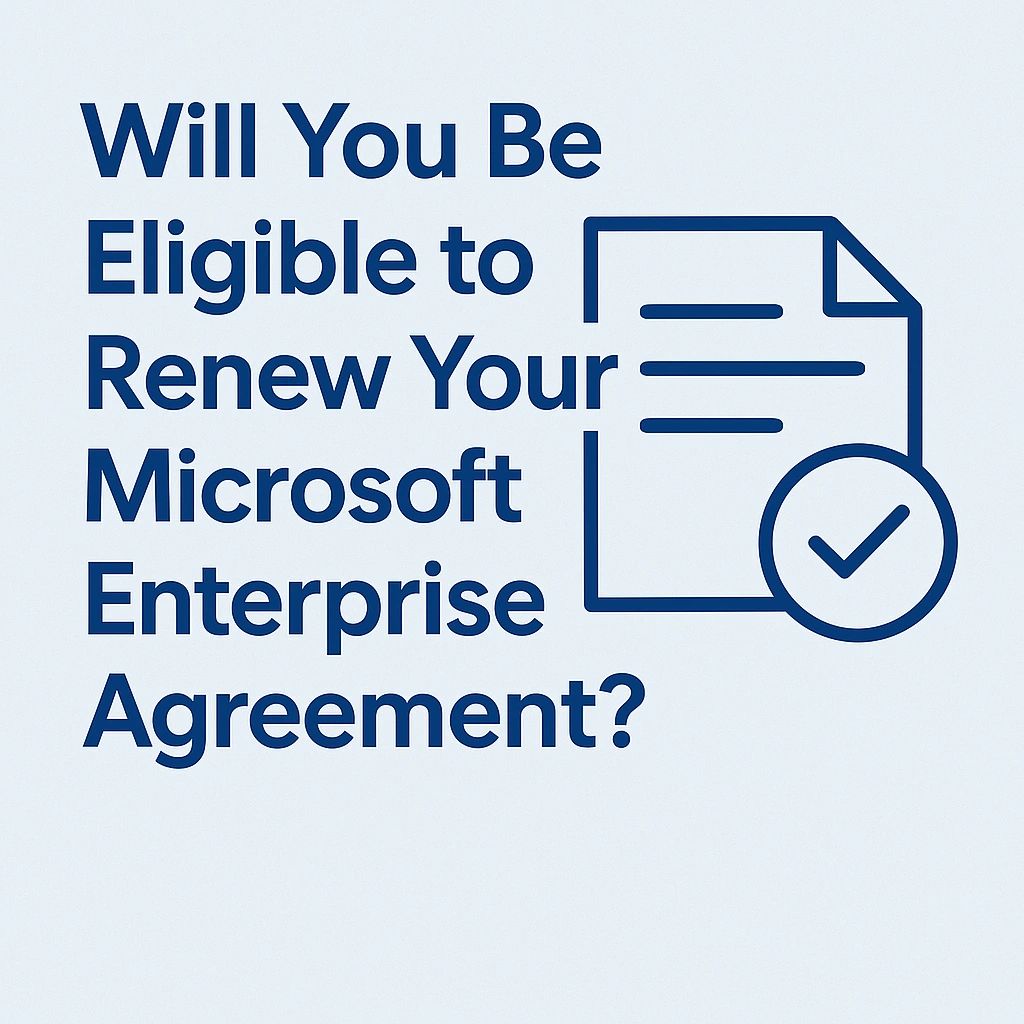
In 2024 Microsoft announced that certain customers will be unable to renew their Enterprise Agreements (EA) at expiration. While this change is limited to a small percentage of organizations, it could be indicative of future changes that may have an impact on a broader audience.
What did Microsoft Announce?
On November 12th, 2024, Microsoft announced:
“Beginning January 1, 2025, a small percentage of cloud Enterprise Agreements (EA) in direct markets will no longer be eligible for renewal under the existing EA framework.”
This change applies to EA customers at discount level A, which is used by organizations with 500-2399 users or devices. Based on the announcement language, this change is specific to “cloud Enterprise Agreements”. While Microsoft does not define “cloud EA”, the terminology implies that the change is specific to EAs that include Azure and online services, and that do not include the traditional server-based licenses that organizations use on-premises and in the cloud.
What is Microsoft’s recommendation for impacted customers?
Microsoft recommends that impacted customers move to the Microsoft Customer Agreement for Enterprise (MCA-E) or the Cloud Solution Provider (CSP) program. Another option for organizations to consider is Open Value and Open Value Subscription. There are significant differences between these programs and Microsoft provides a comprehensive comparison here. Choosing the right licensing program for your business is important and EVOLVE Cloud Services can help your organization identify the most cost effective and strategic licensing options for your current and future needs.
Pricing and Licensing Impact
Transitioning from the EA will have an impact on price for many organizations. In certain scenarios the prices may stay the same or be reduced. For example, a company with seasonal workers may see a reduction in cost using pay-as-you go licensing under these programs rather than purchasing licenses under the EA that may not be needed throughout the year.
However, it is likely that many organizations will experience a price increase due to the loss of EA discounts and the following additional factors. One example of a potential increase is specific to Microsoft Teams. While Teams was historically available at a bundled cost with other M365 products, Microsoft made it a separately purchased product in 2024 with this announcement. EA customers who subscribed to an M365 plan with Teams prior to this change, and who are eligible to renew their EA, can continue purchasing the bundle that includes Teams. However, as organizations transition from the EA to different licensing programs they could be classified as “net new” customers which means they may need to transition to Teams as a stand-alone product (in addition to their M365 subscription), at additional cost.
While Microsoft’s messaging implies that these changes will reduce complexity, organizations may need to maintain multiple agreement types to accomplish their needs. This is especially true for customers who wish to keep Software Assurance (SA) active on perpetual licenses that were previously purchased under their EA. Perpetual licenses and SA are not sold under CSP or MCA, nor is it possible to renew SA on past purchases under these programs.
Without SA on past purchases, organizations are unable to upgrade existing licenses to future versions. They will also lose the option to bring previously purchased perpetual licenses, such as SQL Server, to the public cloud through License Mobility. The alternative for many organizations who cannot renew their EA and who prefer to continue purchasing perpetual licenses with SA (or renewing SA-only) will be Open Value, but pricing is likely to be higher than under the EA. Alternatively, organizations could obtain these licenses under subscription through MCA, CSP, or Open Value Subscription, but for most customers this will result in additional cost versus renewing SA-only on existing licenses.
It is important that organizations understand the implications of moving to a new licensing program prior to making the switch as licensing benefits can vary. For example, unlike other SQL Server subscription licensing options, CSP does not permit customers who purchase SQL Server subscription licenses to bring their own licenses to “Listed Provider” (e.g. AWS, Google Cloud) environments. Bringing SQL Server licenses to the cloud can be highly effective in lowering cost, and losing this benefit can have a significant price impact on the economics of a cloud migration. This is just one example, and various nuances between licensing programs create complexity that organizations should proactively plan for. EVOLVE Cloud Services can help organizations prepare for these challenges.
What does this mean for the future? How should your business prepare?
Microsoft clearly intends to reduce the number of customers eligible for Enterprise Agreements (EA), and this is likely the first step towards that goal. This change has raised legitimate concerns among Microsoft customers that future changes could be extended to larger EA customers, who will then experience the same challenges that smaller organizations are facing today.
As organizations navigate licensing complexity, EVOLVE Cloud Services is a valuable partner. EVOLVE Cloud Services helps organizations evaluate and optimize their on-premises and cloud deployments, while making recommendations that reduce infrastructure size, improve performance, and lower licensing cost. Regardless of whether an organization is impacted by this licensing change (or the next one), proactively evaluating these factors is valuable for organizations as they seek to reduce costs and prepare for future agreement renewals.
If you are interested in learning more about how you can receive an AWS funded Microsoft Licensing & Optimization assessment, please click here.
If you have questions or would like to discuss how EVOLVE can help your organization modernize, optimize and prepare for the future, please reach out to us at: info@evolvecloudservices.com.
